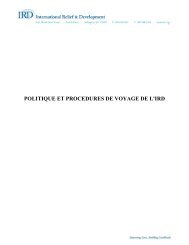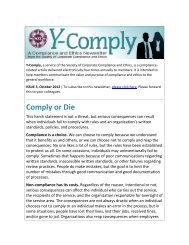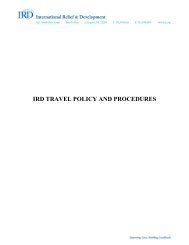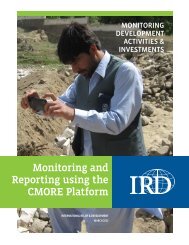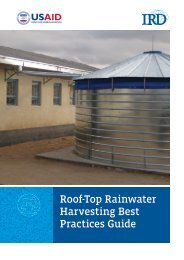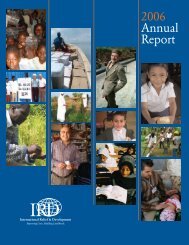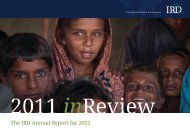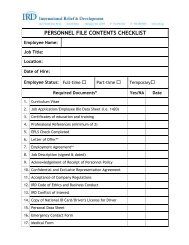Empowering citizens Engaging governments Rebuilding communities
Empowering citizens Engaging governments Rebuilding communities
Empowering citizens Engaging governments Rebuilding communities
You also want an ePaper? Increase the reach of your titles
YUMPU automatically turns print PDFs into web optimized ePapers that Google loves.
Working with local NGOs and government<br />
officials, IRD organized a 10-day summer<br />
“peace camp” for 150 young men and<br />
women. Their hope was that the retreat<br />
might be a gateway to fostering tolerance<br />
maintain them. So we started vocational training by<br />
asking, ‘What types of jobs are needed?’”<br />
The business development component created many<br />
more long-term jobs than did the vocational training<br />
and employment generation component, as intended.<br />
The vocational training was intended to help at-risk and<br />
unemployed Iraqis gain marketable skills. But through<br />
the innovative methods IRD used to link training<br />
courses to market demand and unemployed <strong>citizens</strong> to<br />
employment opportunities, more than 8,000 vocational<br />
training graduates landed long-term jobs as a result of<br />
their training. In addition, the more effective registration<br />
and tracking processes for trainees that IRD put<br />
in place at all the rehabilitated training centers helped<br />
the labor ministry rebuild its capacity not only to teach<br />
Iraqis skills but also to help translate those skills into<br />
jobs. “We always tried to link the local market demand<br />
with what was provided at the vocational training<br />
centers,” said al-Juboori. “Because that was the<br />
objective. We needed to ensure that the unemployed<br />
youth would not be led back into the violence. We built<br />
the ministry’s training capacity 100 percent to stay in<br />
business. And they’re still in business.”<br />
Youth activities: Different from everything else<br />
Iraq’s Ninewa province is among the country’s most<br />
ethnically diverse regions. Tragically, that diversity<br />
helped fuel the rise of the sectarian violence that<br />
gripped the area in 2007. A suicide bombing in a Shia<br />
neighborhood of Tal Afar was blamed for more than<br />
150 deaths, making it at the time the single deadliest<br />
attack since coalition forces entered Iraq. The<br />
bombing led to a wave of retaliatory killings and kidnappings<br />
as gunmen stormed homes throughout Sunni<br />
neighborhoods. Meanwhile, in Mosul, the provincial<br />
capital, rising tensions between Arabs and Kurds led<br />
many Kurds to flee the city. As the situation deteriorated,<br />
Iraqi staff working for CSP in Ninewa developed<br />
a simple program with a lofty aim—to assemble area<br />
youth from different ethnic and religious backgrounds<br />
in an effort to bridge their cultural and religious gaps.<br />
Working with local NGOs and government officials, IRD<br />
organized a 10-day summer “peace camp” for 150<br />
young men and women from across the province. Their<br />
hope was that the retreat, on a small scale, might be<br />
a gateway to fostering tolerance between groups who<br />
were increasingly seeing each other only as enemies,<br />
not as fellow Iraqis.<br />
The first day of camp was a near-disaster. Muslims,<br />
Christians, Arabs, and Kurds were all along for the<br />
retreat, but the different groups refused to come<br />
together, mirroring the tensions so prevalent in the<br />
province. IRD staff spent the first day and night simply<br />
teaching the concepts of tolerance, acceptance, and<br />
religious understanding. “The youth programming<br />
was very different than everything else,” said Barzan<br />
Ismaeel, IRD’s national director for employment generation<br />
and youth. “The outcome was not necessarily<br />
employment, but we were still training people how to<br />
live and interact.”<br />
Through soccer, stronger social ties and teachable<br />
moments<br />
When asked to name CSP’s greatest success, IRD<br />
staffers repeatedly cited the number of jobs created.<br />
US political and diplomatic leaders, when discussing<br />
the program in public forums like congressional testimonies<br />
or media roundtables, used the same point<br />
of reference—jobs. Employment numbers, after all,<br />
offered the most quantifiable statistic in an environment<br />
where measuring results was an erratic, dangerous,<br />
often unreliable process. But the CSP design (and COIN<br />
strategy in general) presumed that the strength of<br />
Iraq’s cultural and community network was at least as<br />
important as employment for the country’s stability and<br />
social cohesion. Organizing safe and secure “communal<br />
activities” was a critical step on the road to reducing<br />
3<br />
Successes and setbacks<br />
49


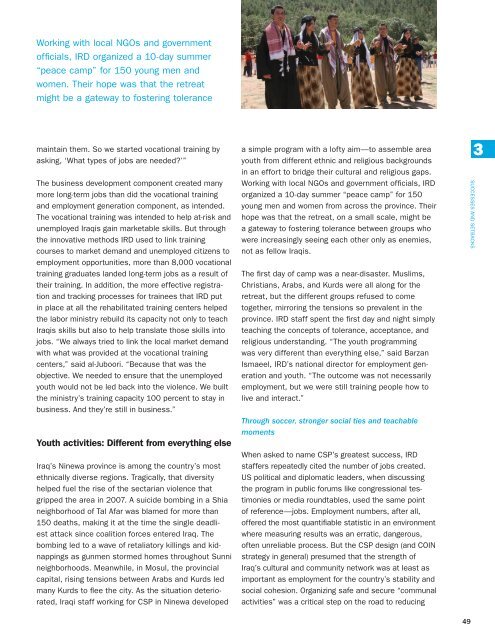
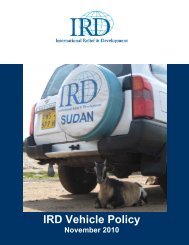
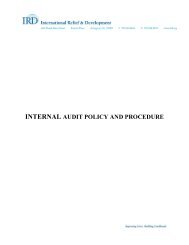
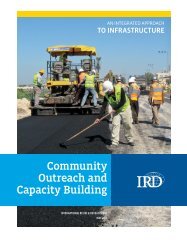
![Guide bonne pratique production d'oignon qualité_VF_4_2411012[1]](https://img.yumpu.com/23506639/1/184x260/guide-bonne-pratique-production-doignon-qualitac-vf-4-24110121.jpg?quality=85)
